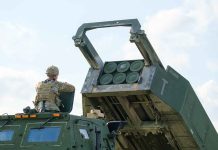
The U.S. military has conducted a precision airstrike on a Houthi command center in Yemen, escalating tensions in the region and raising questions about the future of maritime security in critical waterways.
At a Glance
- U.S. military struck a Houthi command-and-control facility in Sana’a, Yemen
- Airstrike aimed to protect U.S. and coalition personnel, and international shipping
- Houthi militants have increased attacks on vessels in the Red Sea and Gulf of Aden
- Harry S. Truman Carrier Strike Group deployed to bolster maritime security
- Operation Prosperity Guardian launched with 22 nations to defend against attacks
U.S. Military Takes Action Against Houthi Threats
The United States military has taken decisive action against rising maritime threats in the Middle East. A precision airstrike targeted a command-and-control facility operated by Iran-backed Houthi militants in Sana’a, Yemen. This operation comes in response to escalating drone and missile attacks on commercial and military vessels in the Southern Red Sea and Gulf of Aden.
The strike underscores the U.S. military’s commitment to safeguarding critical waterways and protecting international maritime interests. Central Command (CENTCOM) emphasized the necessity of the operation to ensure regional stability and the free flow of commerce.
CENTCOM Conducts Precision Airstrike Against Iran-Backed Houthi Facility in Yemen
On Dec. 16 Yemen time, U.S. Central Command (CENTCOM) forces conducted a precision airstrike against a key command and control facility operated by Iran-backed Houthis within Houthi-controlled… pic.twitter.com/DlZ9SQcAqX
— U.S. Central Command (@CENTCOM) December 16, 2024
International Coalition and Strategic Response
The U.S. is not acting alone in this endeavor. A coalition of nations, including the United Kingdom, has joined forces to counter the Houthi threat. Operation Prosperity Guardian, involving forces from 22 countries, has been launched to defend against attacks on shipping in the region.
To bolster maritime security, the Harry S. Truman Carrier Strike Group has been deployed to CENTCOM’s area of responsibility, including the Southern Red Sea. This strategic move significantly enhances the U.S. military’s capacity to respond swiftly and effectively to emerging threats in the region.
Implications for Global Trade and Security
The Houthi attacks have had far-reaching consequences for global trade. Since November 2023, approximately thirty commercial vessels have been targeted, causing significant disruptions to international shipping routes. Many ships are now avoiding the Suez Canal, opting instead for longer journeys around the Cape of Good Hope.
The economic impact of this crisis is significant, affecting Suez Canal traffic and Egypt’s foreign currency revenues. The international community must collaborate to adapt to these ongoing Yemen-based attacks and their impact on global economic trends.
U.S. Leadership’s Stance on the Conflict
President Joe Biden has taken a firm stance on the issue, emphasizing that the strikes send a clear message against attacks on U.S. personnel and threats to navigation freedom. The President has vowed to take further action if necessary to protect American interests and ensure the free flow of international commerce.
Secretary of Defense Lloyd J. Austin III stated that the coalition’s actions are intended to disrupt and degrade the Houthis’ capabilities to endanger mariners and threaten global trade. The message is clear: further costs will be imposed if the Houthis do not cease their illegal attacks.
As the situation continues to evolve, the U.S. military remains vigilant and prepared to respond to any further threats to maritime security in this critical region. The international community watches closely as efforts to maintain stability and protect global trade interests unfold in the face of ongoing challenges.






















